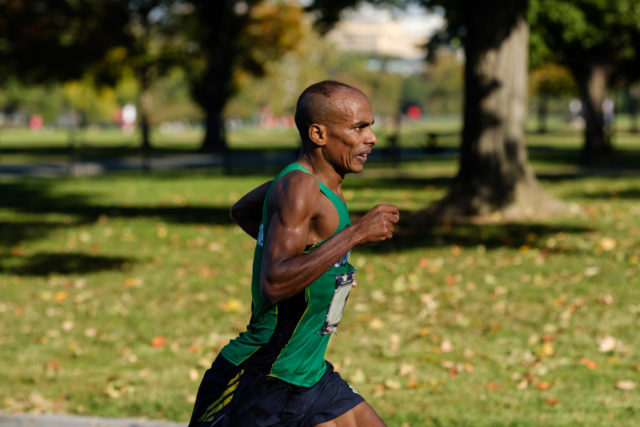
Confusion in the first mile threw much of the leading Marine Corps Marathon pack into chaos, but Arlington’s Desta Morkama eventually overcame a nearly-two-minute deficit, and up to an extra half mile, to win in 2:25:14. Meanwhile, Fairfax’s Sarah Bishop turned a 22-mile training run into a near-Olympic Trials qualifying time (2:45:06).
This all followed a 10-minute delay to allow a suspicious package to be cleared from the course. Read More
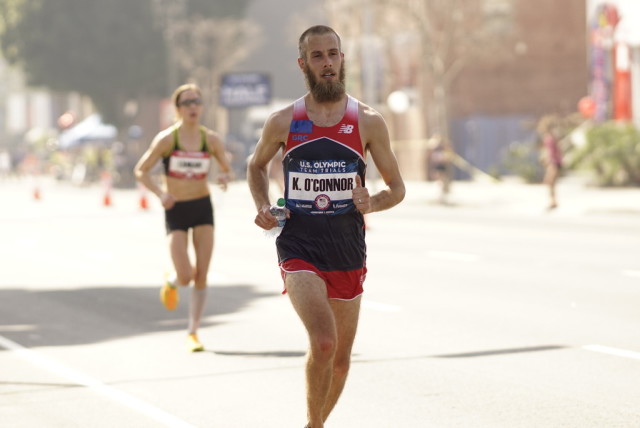
Some of the bags Kieran O’Connor took with him to Los Angeles were packed with racing shoes and a uniform to wear in Saturday’s U.S. Olympic Marathon Trials. The others were stowed under his eyes, after his wife’s early delivery three days before the race gave him their firstborn daughter and the peace of mind that she would not be going into labor while he was out of town.
On Sunday he flew home to his family with a hard-earned 24th place finish in 2:21:37, less than a minute off of his best marathon time run in much cooler conditions, and the knowledge that on the day that effort mattered, he was tougher than most of the field.
Ahead of schedule
His wife, Zyra, woke him at 2 a.m. Wednesday, shortly after her contractions started, two weeks before her due date.
“As soon as she was admitted, she told me I’d have to find another ride to the airport, ” O’Connor said. “I told her to hold on a minute, but she kept telling me, ‘you’re getting on that plane.’ She’s my biggest supporter.”
More Trials coverage
After about 45 minutes of pushing in the early afternoon at Georgetown University Hospital, the “textbook delivery ” was over and O’Connor, 28, had an hour with his daughter Caoimhe (pronounced “Kiva”) before he ran off to pick up his new uniform, pack at his Arlington home and bring some food back to the hospital before catching a few hours of light sleep. The airport shuttle picked him up a little after 4 a.m. at the emergency room entrance.
The couple knew, once O’Connor, 28, hit the half marathon qualifying mark at the Rock ‘n’ Roll Philadelphia Half Marathon Oct. 31, that the timing would be tricky with Zyra’s pregnancy, but felt that more likely than not they’d be fine.
“I thought she was going to come when she was supposed to, or later,” O’Connor said. “Honestly, I felt pretty good about it. I’m just so relieved she came when she did. It wasn’t the best timing but it could have been a lot worse.”
It helped that two of Zyra’s friends had planned to visit this weekend, just in case she went into labor while Kieran was out of town.
“I slept on the shuttle, I slept on the plane,” he said. “When we got to the hotel, I took a four-hour nap. Then we went to the dinner Thursday night and I slept another nine hours after that.”
All competition
Though O’Connor was primed to improve on his PR of 2:20:47, the forecast was going to make that a substantial task. The heat, forecast for the mid-60s around the 10:06 a.m. start, was only going to get worse over the next two hours, and runners would spend most of the 26.2 miles running in the sun.
They were the kind of conditions an uninformed weatherman would call ‘perfect’ for a marathon.
So time was out the window, as it would be for the entire field. O’Conner accepted that early and got even more excited about his chances.
“I told my family that my definition of success was going to be finishing in the top 25,” he said. “You know, why not? Why can’t I be top 25? If I ran tough, I knew I could do it.”
His qualifying time of 1:04:38 from Philadelphia seeded him at 145th place of the 169 men who declared for the race. But this wasn’t a time trial and the meritocratic method of selecting an Olympic team based on on the three top finishes meant racing ability, not just flat-out seed, was paramount
“It was a matter of competition,” O’Connor said. “Pure competition. I monitored the clocks for five miles to make sure I got in a rhythm, but after that I didn’t look at them. I just didn’t care.”
He hung on to one of the chase packs for two of the four six-mile loops running south from downtown L.A. to the University of Southern California and then back north, winking and giving thumbs ups to spectators.
“You could tell he was loose and taking it easy early on,” said Jerry Alexander, O’Connor’s Georgetown Running Club coach. “I saw him look uncomfortable once, at mile 21, but that was it.”
O’Connor was in 46th place when he made his break with eight miles to go and started to move up on his own. He passed five people in mile 18, four in both 19 and 20, then the places were harder to come by.
“People had really strung out, so just kept on passing them,” he said. “Men, women, there was always someone ahead of me.”
He was in 29th place at the start of the final loop, continuing to feast on the victims of attrition, and there were many. Of the 167 runners who started the race, 62 dropped out, including 2008 Olympic Marathoner Dathan Ritzenhein.
“I knew I just had to keep grinding for six more miles,” he said. “There’s nothing else I had to do, just keep grinding. With about three miles to go, I thought, ‘I just have to finish up this loop and I can go home and see my daughter.'”
His mile splits were slowing, but not as fast as others’.
That was about when three people passed him and put a little doubt in his mind. It was the first time he had fallen back in the standings since he made his move at mile 16, but he made up for it as the race went on. With a little more than one mile to go, Alexander told him he was in 26th, and O’Connor saw his targets getting closer.
Tim Ritchie, the 22nd ranked runner, was ahead of him, and O’Connor moved to the other side of the road.
“I had to sneak past him and not give him a chance to latch on,” he said. “If he came with me, I’d have been in trouble, because he’s a much faster runner than me.”
Ritchie didn’t go, and once O’Connor was clear, he focused on the last man ahead of him and surged for home.
Warm reception
While most of the field was bemoaning the high predicted temperatures in the days leading up to the race, O’Connor saw an opportunity. Despite having only about 48 hours to acclimate to the heat, he was confident in his natural resistance to it.
“Maybe if I had been somewhere warm for a few weeks to get ready, it might have made a little difference, but I was fine without it,” he said.
His 2012 Boston Marathon finish, 22nd on a day when temperatures hit the mid-80s, gave him a lot of confidence. Coming from below-freezing temperatures in D.C. didn’t bother him either. He spent early 2012 training in New York City and likewise had no heat acclimation prior to Boston.
“I was less nervous for this race than any race I’ve run for the past four or five years,” he said.
Alexander echoed that.
“That was what jumped out at me, how excited he was to run in the heat,” he said. “We talked about how there were going to be guys quitting out there. On the last lap they’re thinking about what they have to do and deciding it’s not worth it and they’ll go in the tank.”
It was confidence that Alexander developed within a few months of O’Connor joining the Georgetown Running Club in 2013. At the USATF Club Cross Country Championships in Bend, Ore., O’Connor, who had never run a track race in his life and skipped running cross country while at Notre Dame, finished 50th on a rugged course that left many pedigreed runners staggering to the finish line.
“I could see he was the kind of guy who was going to run the entire race, not leave any opportunities out there,” Alexander said. As for Los Angeles, “Obviously he was in phenomenal shape. The mileage, his workouts were fantastic, it couldn’t have been a better buildup, but the mental part preparation is where he made the difference. There couldn’t have been more than five guys ahead of him who were better prepared mentally, he couldn’t have done better for his ability level right now.”
Any question of O’Connor wilting were laid to rest three weeks prior, when he spent the Saturday during Snowzilla running most of his 24.5 miles under the Whitehurst Freeway in Georgetown, a roughly kilometer-long stretch.
“If you’re going to spend 24.5 miles running under Whitehurst Freeway, what do you have to lose at this point?” Alexander said. “He’s already playing with house money, the odds of him being here a year ago were probably 20-to-1.”
Well aware a top-three finish was unthinkable, O’Connor approached this race as his Olympics, but approached it with the same looseness that served him well in the opening miles.
“If I had been just 20 spots higher, I’d have been one spot off of the Olympic team,” he said.
While not going that far, Alexander was confident that O’Connor’s performance was a strong baseline from which to begin even more improvement.
“We’re looking for better in four years,” Alexander said.
The O’Connors will have plenty of leeway to schedule Caoimhe’s fourth birthday party around the race.
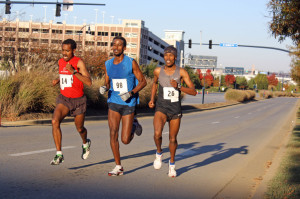
The history of the Woodrow Wilson Bridge Half Marathon is short but impressive.
Four years ago, in its debut year, the women’s race was won by Catherine Ndereba, better known as “Catherine the Great.” In its second year, a new course record was set (1:02:37) and four American men notched qualifiers for the U.S. Olympic Marathon Trials.
The prize purse includes $1,200 for the male and female winners and $600 for top Americans. The race also hosts the Road Runners Club of America National Half Marathon Championships, the Potomac Valley Association USATF Championship and the National Industries for the Blind Visually Impaired National Half Marathon Championships. And with a fun yet challenging course that starts with eight miles on the George Washington Memorial Parkway, climbs over the Woodrow Wilson Bridge, and finishes with a big loop around National Harbor, the race draws more than 3,000 runners of all abilities.
Oh, but those eight opening miles on GW Parkway, a national park …
On day two of the federal government shutdown – four days before the Woodrow Wilson Bridge Half Marathon – Race Director Steve Nearman was forced into making a tough decision.
Due to the shutdown, the race was postponed until November 10, more than a month after the original date. Deferrals to next year’s race were offered and about 600 were processed, Nearman said, while 1,739 runners came out to race on the new date.
Meanwhile, Nov. 10 was as good as Oct. 6 for Kellyn Johnson. The 27-year-old professional runner claimed her second straight win in 1:13:02 and earned prize money in both the overall and American-only divisions.
“It just gave me a little more time to train,” she said. “It was something that was on my schedule before and then it happened to fit perfectly into it after.”
Johnson trains in Flagstaff, Ariz., with Team USA Arizona and said she is still experimenting with distances between 5K and the half marathon. She ran the 5,000- and 10,000-meter races at the 2012 U.S. Olympic Track and Field Trials, and was 4th in this year’s national 10-mile championship hosted by the Cherry Blossom 10 Mile Run. She will return to the area Nov. 17 for the .US National Road Racing 12K Championships.
Johnson was followed by Desta Tadesse of Ethiopia (1:13:53). Waynishet Abebe, an Ethiopian runner who lives in D.C., was 3rd in a personal best time of 1:14:10, just a few weeks after winning the Atlantic City Marathon.
Lindsay O’Brien of Washington, D.C., in her second half marathon, finished 7th overall and was 2nd American. Her time, 1:18:54, was more than a minute faster than her last attempt at the distance.
O’Brien was a three-time cross country All-American at Yale who took a break from competitive running and now trains with Georgetown Running Club.
“I’m trying not to be daunted by the distance,” she said. “This was a good step in the right direction.”
The men’s race was led by a pack of three: Girma Gebre, Siraw Kebede, and Nahom Mesfin, all from Ethiopia.
They raced side by side, charging together up a tough hill in National Harbor. But at the 12-mile mark, Gebre made a strong move to win decisively in 1:04:40.
Gebre has been living in New York with his manager, Alem Kahsay, who said Gebre’s background is in the middle distances. Mesfin, though, is no slouch in the leg speed department, either: He has competed in two Olympics in the steeplechase, and said he spent most of the past nine months training at altitude in Flagstaff, Ariz. Mesfin, however, admitted that Gebre’s move was simply too strong to match.
“Anyway, I’m happy,” he said, smiling after his third-place finish.
The men’s chase pack of four included Georgetown Running Club’s Kieran O’Connor.
O’Connor, 26, has only been running competitively for a few years. But he has already won a marathon and was the 8th American in Boston in 2012. After earning a master’s degree at a university in Cairo, Egypt, O’Connor recently moved to D.C., joined Georgetown Running Club, and – for the first time – started doing speed work under the eye of coach Jerry Alexander.
Going into today’s race, O’Connor’s half marathon best was in the 1:09s. He took it out easy, he said, on the opening downhill from the start in Mount Vernon; men and women were flying ahead of him. But then they started coming back – 5:05 miles clicking away.
At the top of the hill in National Harbor, O’Connor knew his goal of breaking 1:07 was within his reach. And rather than be intimidated by the professional runners surrounding him, O’Conner dropped them on the way to running 1:06:49 – good for 4th overall and top American.
In the visually impaired national championships, Aaron Scheidies, like Johnson, appreciated having extra time to train.
Scheidies won the men’s division last year in 1:18:05. This year, in the week’s before the original race date, Schiedies finished 2nd in the visually impaired division of the triathlon at the London Paralympics. Afterward he took a vacation.
Guided by Georgetown Running Club’s Dave Wertz, Schiedies won his second straight national championship and claimed a new personal best and event record of 1:16:24.
“I didn’t expect it, so I’m really happy with the time,” he said.
Adjusting to a New Race
The Wilson Bridge Half Marathon was supposed to be Briana Whelan‘s tune-up race for the Marine Corps Marathon, her first attempt at 26.2 miles.
When it was postponed, Whelan did not find a replacement race. She nonetheless had a great experience in her first marathon, which she ran with her cousin and uncle.
As for this morning, the Washington, D.C., resident and running newbie ended a two-week break to finish her third half marathon of 2013.
Chris Beeler, a U.S. Army colonel on a year-long assignment in the District, has been training with DC Road Runners and planned to use the Wilson Bridge Half Marathon as a confidence booster for the Army Ten Miler, held on October 20. Her goal race complete, it was hard to stay motivated to run another race, she said.
“But in the end,” she said, “it is what it is, and it was a beautiful day today.”
Miguel Gonzales of Manassas, Va., said the shutdown and the postponement it forced derailed his training. In the 1990s, he ran professionally, but with a busy job and four daughters between 2 and 9, Gonzales – until about a year ago – had more or less stopped running altogether.
“I got to 200 pounds and said I need to lose some weight,” he said. And while today was tough for him and he “felt horrible,” Gonzales said he thought of today’s race as a fresh start.
Mark Geiger of Waldorf, Md., finished his first half marathon, culminating several months of training. He said he could not remember the exact reasons he started running about a year ago – only that he started with walking and, week by week, added a little more running.
“I think it worked out better because the weather today was better,” said Geiger, referring to the rescheduled date.
The weather this morning was perfect for racing. October 6 in Washington, D.C., on the other hand, was a hot day. And let me tell you: This runner has woken up on many such race days and thought to himself: Man, if there’s any way this race could be postponed …
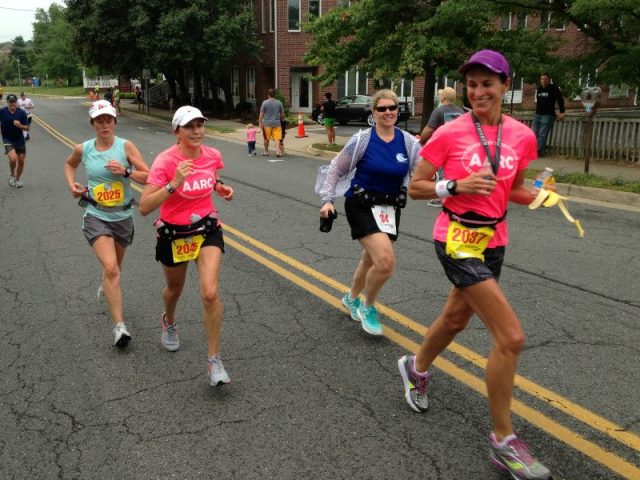
Any runner who understands the basics of delayed gratification — a principal so central to this sport — could appreciate the Leesburg 20k’s new course, now in its second year. The rolling hills on Dry Mill Road are gone, replaced by a long, grinding grade on the W&OD Trail, one that snuck up on South Riding’s Tatiana Sheptock.
“My eyes wouldn’t see it, but my legs felt it,” she said. “It definitely felt a lot better on the way back.”
She made her return to the race after an eight-year absence. She’s seen some change since then — when she ran she ran 1:40:47 on her way to finishing the Marine Corps marathon in 3:42:40 two months later.
This year, she ran 1:19:48 for third place, and will head into another marathon training effort with hopes of running 3:05 at Marine Corps.
“I’m a completely different runner now,” she said. “The race feels different, and I’m running paces for long races I could barely keep up for shorter distances.”
Both winners took advantage of the relief that came with the downhill to make their moves. Men’s winner Sean Barrett pulled away from Kieran O’Connor after the turnaround and ran to a 1:06:18 finish. Women’s winner Meghan Ridgley, of Ashburn, broke away from Arlington’s Erin Taylor after 7.5 miles to go onto an almost one-minute margin of victory- 1:17:16 to 1:18:12. Both are training for marathons, Ridgley Philadelphia and Taylor Richmond.
“I love this course,” Ridgley said. “It’s fun and you can see other people on your way out and back. A bunch of people I coach were out here and they did great.”
Ridgley coaches, and races, with the Potomac River Running training program, as does Sheptock and hordes of other top finishers.
Barrett’s race strategy changed as soon as he realized that his trainers were not going to cut it. In the rush to get out the door of his Arlington home to get to Leesburg for the 7:30 start, he forgot his racing flats.
“I tried to push off on my toes, but after a few miles it wasn’t happening,” he said. “I became a heel striker for the rest of the race.”
He’s looking ahead to the Rock ‘n’ Roll Philadelphia Half Marathon, Army Ten Miler, .US Road Racing Championships 12k and USATF Club Cross Country Championships in Bend, Ore., where he’s headed with some of his Georgetown Running Club teammates in December.
O’Connor, who finished as the eighth American at the 2012 Boston Marathon, hadn’t competed since that scorcher, but acquitted himself well on the course to run 1:06:40.
“I was freaking out trying to find a bathroom seven minutes before the race, and ended up not taking my inhaler,” he said. “So I had my torso feeling pretty uncomfortable for a while.”
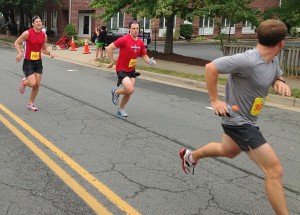
Though runners from farther east cleaned up on the men’s top spots, 249 of the 892 20k finishers were from Leesburg, Ashburn and Sterling, representing well at one of Loudoun County’s top races.
Carole Jones estimated that the Ashburn Area Running Club had more than 30 runners out on the course, and many PRed.
“The camaraderie was incredible,” she said. “It’s hard not to run well when you have so much support out there. I felt like I saw people I knew every minute.”
Jones ran 1:31:24 to finish 15th and second in her age group, second if only because Oak Hill’s DeeDee Loughran ran 1:22:35 to dominatingly win the women’s masters title. McLean’s John Zimmerman ran 1:11:41 to lead the male masters.
Kris Wolcott loved the opportunity to run near home.
“It was a home course advantage,” she said. “I run here every day and knowing the course made the race a lot less nerve-wracking.”
She was enthusiastic about seeing Ridgley, her coach, running so well. Like Ridgley, she’s headed to the Philadelphia Marathon in November — her first.
The race also included a 5k, won by Hugh Toland in 16:16 and Margie Shapiro in 18:19. That option appealed to Sterling’s Jason Lovelady, who ran it while his wife, Suzanne, ran the 20k.
“I’m not a runner, but I like to come to races with her,” he said. “The course was flat, so that appealed to me. It sounds like she wasn’t crazy about the hills in the longer race.”
The pair is considering their fall racing schedule, perhaps making a repeat trip to a costumed race, where last year the ran as Popeye and Olive Oil.
“Maybe not so much polyester this year,” he said. “That wasn’t really comfortable.”
| Leesburg 20k/5k |
| Aug. 18, 2013, Leesburg, Va. |
| Results: 20k 5k |
| Photos 1 Photos 2 Photos 3 |


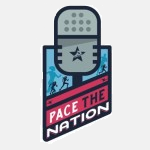 Hear Kieran and Zyra talk about the race and new parenthood on Pace the Nation
Hear Kieran and Zyra talk about the race and new parenthood on Pace the Nation